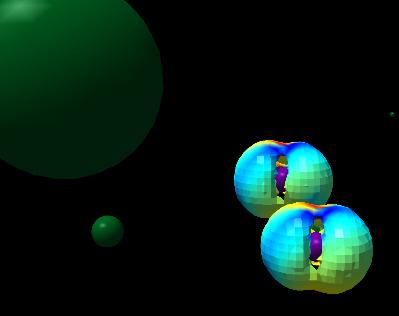
Victor S. Batista and David F. Coker
Department of Chemistry
Boston University
We investigate the photodissociation, geminate recombination and relaxation dynamics in size selected I2¯·Arf cluster ions using a coupled quantum-classical molecular dynamics method and a model Hamiltonian gained from diatomics-in-ionic systems. We calculate photofragmentation yields of various charged product clusters of the dissociated I2¯·Arf or recombined I2¯·Arf’ forms as a function of precursor cluster size and find almost quantitative agreement with experimental results. The trends in photofragmentation are explained in terms of various participating electronically nonadiabatic channels coupled with vibrational relaxation on these different surfaces. We also explore the role of long range electrostatic interactions and underlying precursor cluster geometry in the photofragmentation dynamics.
This work was published in J. Chem. Phys. 106(17), 7102-7116,1997.
Video Segments
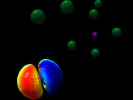
Video Sequence
Segment 1: Dissociation and Solvation Forming I¯·Arf Cluster.
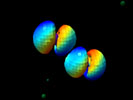
Video Sequence
Segment 2: Excited State Recombination Forming I2¯·Arf Cluster.

Video Sequence
Segment 3: Ground State Recombination and Evaporation Forming I2¯·Arf Cluster.
Still Images (1264 x 984 RGB images)
From First Sequence (zoomed in)
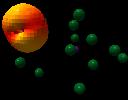
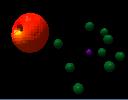
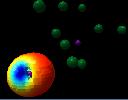
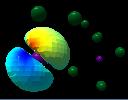
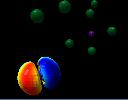
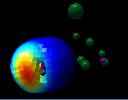
From Third Sequence (zoomed in)
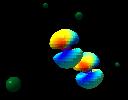
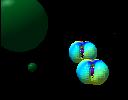
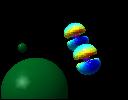
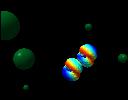
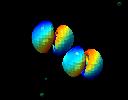

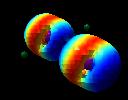
Hardware: SGI Power Challenge Array and SGI Origin2000.
Software: Fortran 77, MPI. Visualization: IDL, C, IRIS Performer.
Graphics programming and video production: Erik Brisson and Robert Putnam, Scientific Computing and Visualization Group, Boston University.
Acknowledgments: We gratefully acknowledge financial support for this work from the National Science Foundation (Grant No’s. CHE-9058348 and CHE-9521793), and the Petroleum Research Fund administered by the American Chemical Society (Grant No. 27995-AC6), and a generous allocation of supercomputer time from Boston University’s center for Scientific Computing and Visualization.
